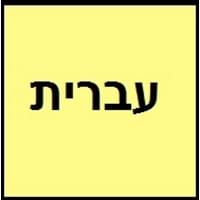Countries
Israel
Andaman and Nicobar Islands, Bangladesh, India, Sierra Leone
National Language
Israel
Bangladesh, India
Second Language
Israel
India
Speaking Continents
Africa, Asia, Europe
Asia
Minority Language
Poland
Australia, Canada, Italy, Japan, Kuwait, Malaysia, Maldives, Nepal, Oman, Pakistan, Qatar, Saudi Arabia, Singapore, South Africa, South Korea, United Arab Emirates, United Kingdom, United States of America
Regulated By
Academy of the Hebrew Language
Bangla Academy, Paschimbanga Bangla Akademi
Interesting Facts
- The original language of Bible is Hebrew.
- The men and women use different verbs in hebrew language.
- Bengali language is the World's sweetest language.
- 21st February is celebrated as an International Mother Language day, which is based on Bengali language.
Similar To
Arabic and Aramaic languages
Assamese and Oriya
Derived From
Aramaic Language
Sanskrit Language
Alphabets in
Hebrew-Alphabets.jpg#200
Bengali-Alphabets.jpg#200
Scripts
Hebrew
Bengali, Brahmic family and derivatives
Writing Direction
Right-To-Left, Horizontal
Left-To-Right, Horizontal
Hello
שלום (Shalom)
হ্যালো (Hyālō)
Thank You
תודה (Toda)
ধন্যবাদ (dhonnobad)
How Are You?
מה שלומך? (ma shlomxa)
কেমন আছিস? (kêmon achhish?)
Good Night
לילה טוב (Laila tov)
শুভরাত্রি (shubhoratri)
Good Evening
ערב טוב (Erev tov)
শুভ সন্ধ্যা। (shubho shondha)
Good Afternoon
אחר צהריים טובים (Achar tzahara'im tovim)
ভাল বৈকাল (Bhāla Baikāla)
Good Morning
בוקר טוב (Boker tov)
সুপ্রভাত (shuprobhat)
Please
בבקשה (bevekshah)
অনুগ্রহ করে (Anugraha karē)
Sorry
סליחה! (Slicha)
দুঃখিত (dukkhito)
Bye
להתראות (Lehitraot)
বিদায় (Bidāẏa)
I Love You
אני אוהבת אותך (Ani ohevet otcha)
আমি আপনাকে ভালোবাসি (ami apnake bhalobashi)
Excuse Me
בבקשה!
মাফ করবেন (Māpha karabēna)
Dialect 1
Ashkenazi Hebrew
Chakma
Where They Speak
Israel
Bangladesh, Burma, India
How Many People Speak
Not Available
Dialect 2
Samaritan Hebrew
Hajong
Where They Speak
Israel, Palestine
Bangladesh, India
How Many People Speak
Not Available
Dialect 3
Yemenite Hebrew
Rarhi
Where They Speak
Israel
India
Speaking Population
Not Available
Native Name
עברית / עִבְרִית (ivrit)
বাংলা (baɛṅlā)
Alternative Names
Israeli, Ivrit
Bangala, Bangla, Bangla-Bhasa
French Name
hébreu
bengali
German Name
Hebräisch
Bengali
Pronunciation
[(ʔ)ivˈʁit] - [(ʔ)ivˈɾit]
Not available
Ethnicity
Not Available
Bengalis (Bengali people)
Origin
1000 BC
1000–1200 CE
Language Family
Afro-Asiatic Family
Indo-European Family
Subgroup
Semitic
Indo-Iranian
Early Forms
Biblical Hebrew, Mishnaic Hebrew, Medieval Hebrew, Hebrew
Abahatta, Old Bengali
Standard Forms
Modern Hebrew
Bengali
Signed Forms
Signed Hebrew
Not Available
Scope
Individual
Individual
ISO 639 6
Not Available
Not Available
Glottocode
hebr1246
beng1280
Linguasphere
12-AAB-a
59-AAF-u
Language Type
Living
Living
Language Linguistic Typology
Subject-Verb-Object, Verb-Subject-Object
Not Available
Language Morphological Typology
Fusional, Synthetic
Not Available
Hebrew and Bengali Greetings
People around the world use different languages to interact with each other. Even if we cannot communicate fluently in any language, it will always be beneficial to know about some of the common greetings or phrases from that language. This is where Hebrew and Bengali greetings helps you to understand basic phrases in Hebrew and Bengali language. Hebrew word for "Hello" is שלום (Shalom) or Bengali word for "Thank You" is ধন্যবাদ (dhonnobad). Find more of such common Hebrew Greetings and Bengali Greetings. These greetings will help you to be more confident when conversing with natives that speak these languages.
Hebrew vs Bengali Difficulty
The Hebrew vs Bengali difficulty level basically depends on the number of Hebrew Alphabets and Bengali Alphabets. Also the number of vowels and consonants in the language plays an important role in deciding the difficulty level of that language. The important points to be considered when we compare Hebrew and Bengali are the origin, speaking countries, language family, different greetings, speaking population of these languages. Want to know in Hebrew and Bengali, which language is harder to learn? Time required to learn Hebrew is 44 weeks while to learn Bengali time required is 44 weeks.





